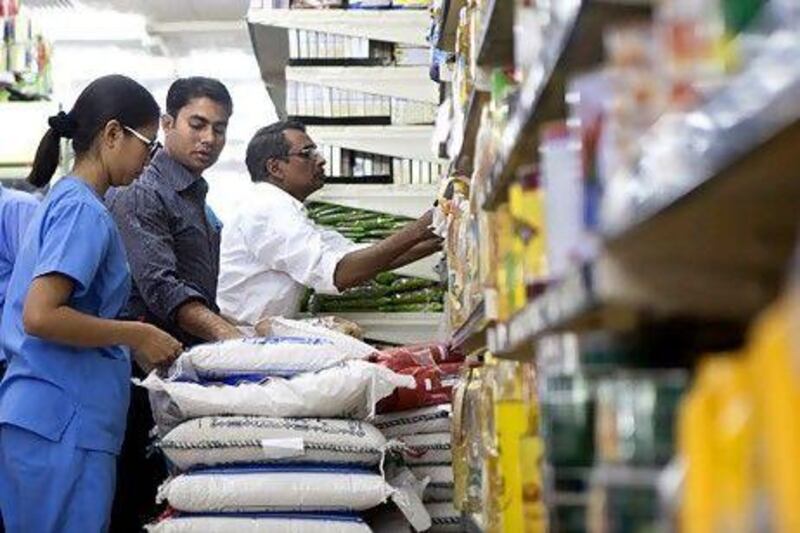Food prices for Emiratis are set to fall next month after the Government yesterday ordered a Ramadan subsidy to be applied throughout the year, potentially saving each household Dh13,000 (US$3,539).
The Ramadan Ration project is run by the Sheikh Khalifa bin Zayed Humanitarian Foundation (KZHF) and subsidises food during the holy month. It is now being extended to the full year, following orders from Sheikh Khalifa, President of the UAE. Officials said the subsidised food for all Emiratis will be available from tomorrow.
"The previous project was only for people registered with the Ministry of Social Affairs," said Mohammed Haji Al Khouri, the director general of the KZHF. "But this one is for all locals," he said.
The first project, launched in 2009, was for nearly 45,000 Emiratis during the month of Ramadan and it included the sale of only subsidised flour and rice.
This year's initiative will extend to all national families resident in the country and encompass more items, including dates, cooking oils, juices, various types of water and tomato paste.
"They can buy these items 20 to 30 per cent lesser than the market price and all through the year," said Mr Al Khouri.
The foundation had been examining the move after an extensive survey that found shoppers could save Dh13,000 a year with the new food subsidies, rather than Dh1,500 that was saved during Ramadan.
The KZHF will purchase the items at market price then facilitate their distribution through all the municipalities in all the emirates except Dubai.
The official did not have immediate figures on how much the move would cost the foundation annually.
"In Dubai, it will be distributed through Al Ittihad Cooperative Society. In the Northern Emirates and Abu Dhabi, it will be distributed through the municipalities," said Mr Al Khouri.
Emiratis will have to present their ID cards at these centres to buy at the cheaper rate. He said they would consider increasing the distribution locations, if necessary.
The move is the latest by the UAE Government to keep the prices of food low for citizens.
Last month, the Ministry of Economy introduced a nationwide online price monitoring system that means supermarkets have to report the prices of 200 basic goods online every Tuesday.
The cost price and the selling price are monitored by the Government to ensure that retailers are not applying unfair increases.
The Electronic System for Goods Monitoring, which was first announced at the end of February, monitors the prices of certain goods at outlets including the cooperative societies, Lulu Hypermarket, Carrefour, Spinneys and wholesale suppliers.
Retailers must report the prices of rice, wheat, poultry, sugar, milk, tea, meat, eggs, edible oils, fish and non-food items such as cosmetics.
In January, the Government also looked to increase competition among suppliers by liberalising the trade in 12 kinds of food products including dairy, juices, meats and oils.
These moves have helped to lower the prices of basic goods on the country's shelves. A basket of basic foods, including flour, bread and meat, fell 15 per cent in the first quarter, compared with the end of last year, according to an analysis by The National last month. Prices for branded goods such as Kellogg's cornflakes and Heinz ketchup fell by 7 per cent.
Global food prices hit record highs in February last year, but have since steadily declined, falling 1.4 per cent last month compared with March, according to the United Nations Food and Agriculture Organization index.
Outside the UAE, other governments in the region dipped into public finances last year to raise subsidies to offset higher prices of staples such as rice and bread.
Like the UAE, governments such as Egypt and Tunisia have taken measures to protect their citizens from rising prices, dipping into public coffers and raising subsidies to offset higher prices of staples such as rice and bread.
pkannan@thenational.ae
twitter: Follow and share our breaking business news. Follow us
iPad users can follow our twitterfeed via Flipboard - just search for Ind_Insights on the app.





